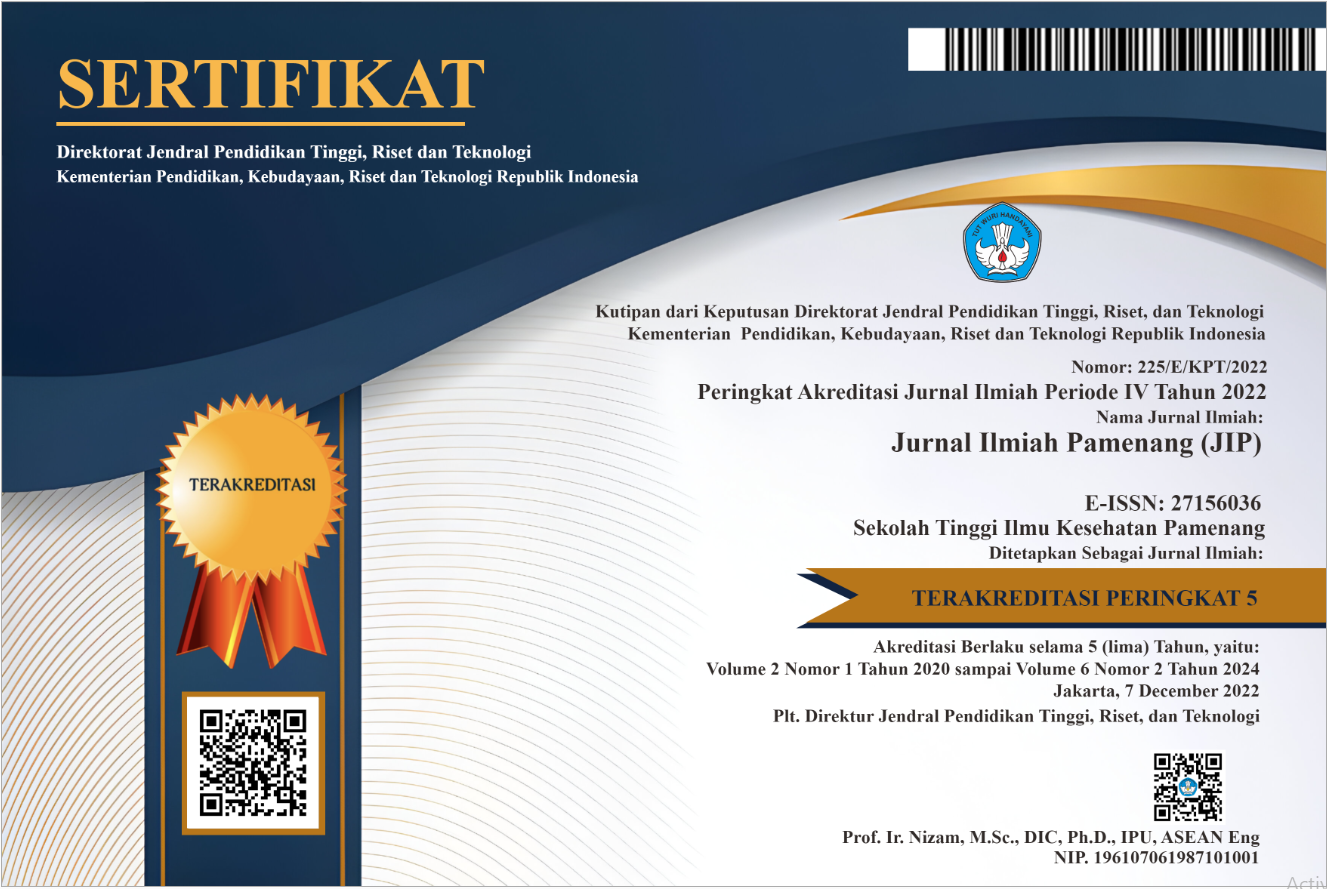GANGGUAN POLA TIDUR PADA LANSIA HIPERTENSI
SLEEP DISORDERS IN HYPERTENSION ELDERLY
DOI:
https://doi.org/10.53599/jip.v4i2.98Keywords:
Hipertensi, Gangguan Pola Tidur, Lansia, Hypertension, Sleep Pattern Disorders, ElderlyAbstract
Abstrak
Hipertensi merupakan keadaan yang mana terjadi peningkatan tekanan darah sistolik dan diastolik di atas batas normal yaitu ≥ 140/90 mmHg. Gejala utama yang biasanya dirasakan adalah sakit kepala, jantung berdebar-debar, mudah lelah, sukar tidur, serta rasa berat di tengkuk, dan lain-lain. Jumlah kasus Hipertensi menurut Riskesdas 2018 di Indonesia sebesar 63.309.620 orang. Prevalensi penduduk dengan tekanan darah tinggi di Provinsi Jawa Timur sebesar 36,3%, prevalensi ini dapat meningkat seiring dengan pertambahan umur. Hipertensi yang tidak dikontrol dengan baik akan berdampak juga terhadap kualitas tidur dan pola tidur penderita hipertensi. Analisis dari Sleep Fairth Health Study menggunakan sampel besar ±6.000 orang dewasa di Amerika Serikat menunjukkan durasi tidur yang pendek (≤5 jam/malam) dikaitkan dengan risiko kejadian hipertensi 60% lebih tinggi pada usia (32- 59 tahun) dibandingkan dengan orang tanpa gangguan tidur. Hubungan tersebut semakin kuat, dengan responden yang kurang tidur (<6 jam/malam) memiliki peningkatan risiko hipertensi sebesar 66%. Tujuan tinjauan pustaka ini adalah untuk mengkaji lebih dalam publikasi hasil penelitian yang berkaitan dengan gangguan pola tidur pada lansia penderita hipertensi. Metode penulisan studi literatur ini adalah merujuk artikel publikasi jurnal nasional dengan topik terkait hubungan gangguan pola tidur terhadap hipertensi dan disajikan dalam bentuk artikel. Hasil dari artikel yang sudah ditelusuri adalah terdapat hubungan antara gangguan pola tidur terhadap hipertensi dan gangguan pola tidur yang buruk dapat meningkatkan resiko terjadinya hipertensi. Kesimpulan yang dapat diambil adalah antara pola tidur dengan hipertensi masing-masing saling berkaitan dan pola tidur yang buruk turut mempengaruhi resiko terjadinya hipertensi dan penderita hipertensi juga cenderung mengalami gangguan pola tidur.
Abstract
Hypertension is a condition in which there is an increase in systolic and diastolic blood pressure above the normal limit of ≥ 140/90 mmHg. The main symptoms that are usually felt are headaches, heart palpitations, fatigue, difficulty sleeping, as well as heaviness in the nape, and others. The estimated number of hypertension cases according to Riskesdas 2018 in Indonesia is 63,309,620 people. The prevalence of the population with high blood pressure in East Java Province is 36.3%, this prevalence can increase with age. Hypertension that is not controlled properly will also have an impact on the quality of sleep and sleep patterns of people with hypertension. Sleep Fairth Health Study using a large sample of ±6000 adults in US, showed a significantly higher prevalence of hypertension in people with an average of 7-8 hours. The relationship is getting stronger, with respondents who are sleep deprived (< 6 hours/night) having an increased risk of hypertension y 66%. The purpose of this literature review is to examine more deeply the publication of research results related to sleep pattern disorders to hypertension in people with hypertension. The method of writing this literature study is to refer to articles published in national journals with topics related to the relationship of sleep pattern disorders to hypertension and presented in the form of articles. The result of the article that has been explored is that there is a relationship between sleep pattern disorders to hypertension and poor sleep pattern disorders that can increase the risk of hypertension. The conclusion that can be drawn is that the relationship between sleep patterns and hypertension is each interrelated and bad sleep patterns also affect the risk of hypertension.
Downloads
Downloads
Published
Issue
Section
License
Copyright (c) 2022 Jurnal Ilmiah Pamenang

This work is licensed under a Creative Commons Attribution-NonCommercial 4.0 International License.






.png)


